The lack of transparency within the leather industry has earned it a bad reputation among designers and brands. But practices such as using leather byproducts, plant-based, organic tanneries, and making sure you're up-to-speed with the latest certifications and standards, make it possible to use animal leather in an ethical and sustainable way today. If animal products don't meet your personal ethical choices, designers are spoilt for choice with the range of vegan leathers and biomaterials offering an alternative material from which to create accessories and other garments.
This Masterclass answers your questions about how the leather industry can operate with transparency and traceability, how leather processing fits into the agricultural landscape, what certifications are out there and what they ensure, and how alternative leather materials meet the requirements for beautiful, sustainable accessories.
In this Masterclass, you will learn:
- What constitutes ethical and environmentally friendly leather in terms of processing and treatment
- Arguments to offer a wider perspective on common leather industry processes
- How to ensure traceability and transparency in your leather supply chain
- How designers and supply chain platforms are reducing waste in the design of leathergoods
- About repair and recycling approaches for leathergoods
- What defines a biomaterial and how designers can help shape their future in the industry
- About alternative materials to animal leather for bags and accessories, including cork and biocomposites
- What the organic sheepskin tanning process entails, and how it differs to conventional tanning
- How the leather industry through regenerative agriculture can provide climate positive impacts
- Some vegan leather alternatives; their applications, pros and cons and how to work with them
-
Working Responsibly And Collaboratively With Leather And Biomaterials
with Stephanie SteeleRead More...Summary
In our August 2020 panel discussion, we were joined by two material researchers and multi-disciplinary designers to talk about leather, biomaterials, and sustainable accessories. Covered in this talk was Alice Robinson's fascinating work on zero waste farm-to-fashion leather production and the opportunities for biomaterials across various industries with Materiom's Zoe Powell.
About our speakers
Alice Robinson is a multi-disciplinary designer, maker and researcher who created a zero-waste supply chain from animal to food to accessories through her Royal College of Art graduate collection 'Sheep 11458' and subsequent project, 'Bullock 374' that was shown as part of the V&A Museum's 2019 exhibition, Food: Bigger Than the Plate. Check out her work here.
Zoe Powell is a material researcher working, for the last 10 years, on facilitating projects in a variety of industries, with a focus on the reduction of waste through circular and creative resource use. Zoe works at Materiom, an open-source recipe and data platform that works with materials made from abundant sources of natural ingredients.
**Please be aware that the video and key takeaways contain descriptions of processes within the leather and meat industries.**
-
The Arguments For A Climate-Positive UK Sheepskin Industry
with Mark RaymondRead More...Summary
Mark Raymond, owner of Organic Sheepskins and UK sheep farmer at Neville Farm, joins us to explain how he came to own this certified organic farm and run a certified organic tanning process producing sheepskin rugs and products for wide-ranging clients.
We dive straight away into the state of sheep farming in the UK, with insight into the high animal welfare standards and traceability of these byproduct fleeces. The farm is also 'carbon positive', and Mark explains what regenerative agriculture is for his farm, and the case for it being possible to help combat climate change. We also controversially look at veganism, and the affect of this lifestyle/ethical choice on production and marketing of leather alternatives, along with arguments for plant-based people being open to witnessing how Organic Sheepskins are benefitting the system.
This is a two part lesson: in part two, you can discover what the organic tanning process actually is, what makes it certifiably organic, and pricing structure for such products. These two lessons should give you a fresh and unique perspective on a side of the industry that is usually behind closed doors.
**Please be aware that the video and key takeaways contain descriptions of processes within the leather and meat industries.**
-
The Organic Sheepskin Tanning Process
with Mark RaymondRead More...Summary
This is an 18 minute lesson where we continue on with Mark Raymond, owner of Neville Farm and Organic Sheepskins, to understand how the organic tanning process differs to a conventional one, and what the benefits and drawbacks are either way. We look specifically at the steps taken to organically tan a raw sheepskin, the certifications that validate the organic claims (for the farm and for the process), and what the pricing structure is like for such a product. Mark also explains why his sheepskins are NOT suitable for fashion - or at least in their current form - with visual examples of sheepskins so that you can recognise the variety of possible applications for such a material.
This is part two of Mark's lessons, with the first one covering the UK sheepskin industry, and how regenerating land and working organically can positively impact the climate. Find Part One here.
**Please be aware that the video and key takeaways contain descriptions of processes within the leather and meat industries.**
-
Leather Production Misconceptions, Traceability and Alternatives
with Kerry SeniorRead More...Summary
Busting popular myths about the environmental and ethical issues surrounding leather, Kerry Senior, Director of Leather UK, the trade association for the UK’s leather industry, presents some surprising facts behind this much-misunderstood material.
This Lesson covers leather’s origins as a byproduct, its inherent connection to the agricultural sector, methane emissions and how leather stacks up against synthetic alternatives – everything a designer or business needs to know to make informed choices about their materials.
Head to part two of this conversation where we dive deeper into the topic and learn about chrome-tanning and exotic leathers.
Thumbnail image: DEFRA
-
A Vegan & Sustainable Alternative To Down Feathers
with Charlie Bradley RossRead More...Summary
The use of down poses an ethical problem for the fashion industry, however, finding a good synthetic alternative has not always been easy. In this lesson, we look at how one company has innovated in an attempt to solve this problem using natural properties.
Interviews
Sipahi & Co: Working with producers in the UK leather industry
Sunday Oct 1st, 2017
Martina Spetlova: Traceable Handmade Leather Fashion Goods
Sunday Nov 1st, 2020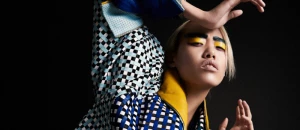
Fashion Without A Face: Initiating Conversation With Ethical Cork Accessories
Sunday Nov 1st, 2020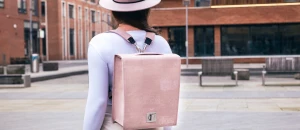
Alice Robinson: Leather Production Under A Regenerative Regional Model
Sunday Nov 1st, 2020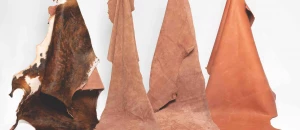
Alice Robinson: Connecting Food, Farming And Fashion
Monday Mar 1st, 2021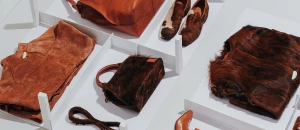
Technical Tutorials
Growing vegan leather from coconut water
Saturday Sep 1st, 2018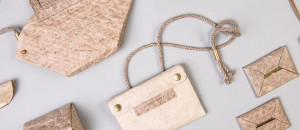
Chrome-Tanned Leather and Exotic Skins
Monday Feb 1st, 2021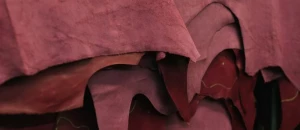
Additional reading:
DESSERTO cactus leather made into shoes
MycoWorks raises $45m to produce biomaterial Reishi™
Sustainable Material Guide: Leather Alternatives [Supply Compass]
Follow on Masterclasses:
Manufacturing Responsible Accessories And Leathergoods
Recycled Fabrics: The Social, Economic and Environmental Impacts
Additional Reading
Top Takeaways from The Regenerative Fashion Conference
Sunday Oct 1st, 2023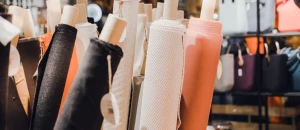
How Much Deforestation Is Your Cotton Creating?
Tuesday Jul 20th, 2021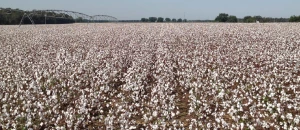
Future Fabrics Expo 2021: Biodiversity, Natural Fibres and Regenerative Textiles
Sunday Jul 11th, 2021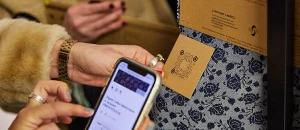
How to create positive impact with natural materials
Monday Apr 12th, 2021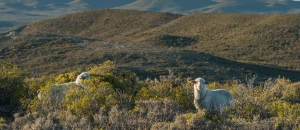
Fabrics From Food Waste, Mushroom And Weeds
Wednesday Mar 10th, 2021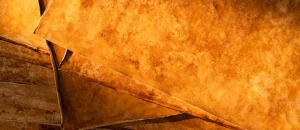
Does Bioengineering Hold the Key to Our Material Future?
Monday Feb 15th, 2021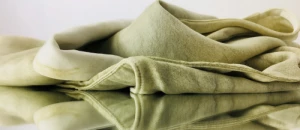
Highlights From The Virtual Oxford Real Farming Conference 2020 - Part Three
Monday Feb 1st, 2021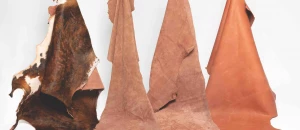
Highlights From The Virtual Oxford Real Farming Conference 2020 - Part Two
Monday Jan 25th, 2021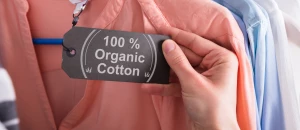
Highlights From The Virtual Oxford Real Farming Conference 2020 - Part One
Monday Jan 18th, 2021
The Knitwear and Accessory Brands to Support this Winter
Wednesday Dec 9th, 2020
